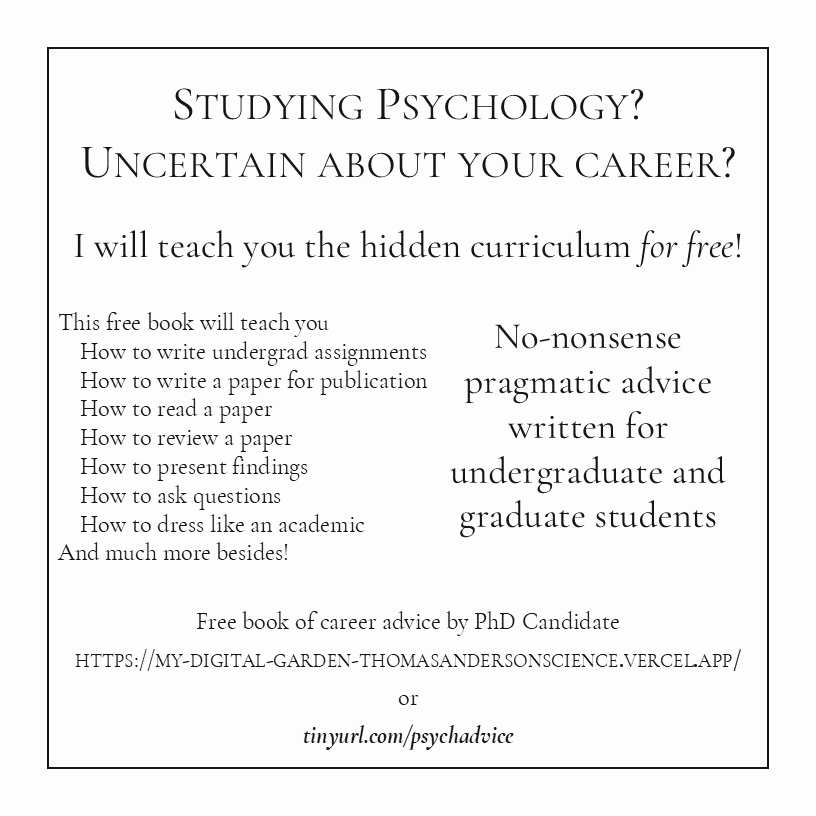Background on the author
I'm a PhD Candidate in cognitive neuroscience.
My website is https://thomasanderson.ca
My email is thomas.anderson.science@proton.me
I study attention, particularly meta-awareness and mind-wandering. I've also done research on meditation, creativity, psychedelic microdosing, and, when I was an undergrad, research on face-processing. I've run observational community surveys, in-lab experiments, and field interventions. I've collected data using questionnaires, behavioural tasks, skin-conductance, eye-tracking, EEG, fNIRS, and MRI. I've also been involved in a Clinical Trial approved by Health Canada. For my funding history, please see my CV.
I have mentored more than a dozen research assistants (RAs), a number of whom have gone on to grad school or medical school. I've collaborated with undergraduate RAs, other graduate students, psychiatrists, and professors. I worked as a teaching assistant (TA) for about a dozen undergraduate courses. I have given a few guest lectures, but I have not taught any courses.
I started my undergrad in software engineering and switched into psychology after three years and three co-op work terms. This background is pretty uncommon in grad school so I don't consider myself or my experiences typical. Hopefully my experiences can be useful to you!
I'm especially interested in Open Science, preregistration, and maintaining a critical understanding of the philosophy of science behind what we do. I care about asking reasonable questions and making reasonable inferences from data.

My stance on the Replication Crisis
Personally, I see the replication crisis as a painful human failing that reflects what happens when personal integrity, under systemic pressure, gives way to career pursuits. While some scientists held true, many of our academic elders sacrificed research integrity for career advancement, whether for greater publishability or for a shot at 15 minutes of fame.
There were, and still are, systemic issues made emblematic by the phrase "publish or perish". Nevertheless, it concerns me when broaching this topic results in an immediate diffusion of responsibility among researchers. Yes, there are systemic issues pervading academia. Even so, failing to live up to standards when the system provides an incentive to cut corners is still a personal failing.
My stark perspective may come from my background in engineering ethics.
We were taught that lives depend on personally maintaining professional and ethical standards. Perverse incentives also exist for engineers, but professional ethics demands that engineers maintain their high standards. Professional ethics relies on personal integrity going above and beyond systemic limitations, perverse incentives, and legal loopholes.
At the end of the day, the people are the system: when the people fail, the system fails. Having integrity is easy when the system works in your favour, but that means integrity is most important when it is most difficult to maintain.
The replication crisis reveals a failure of integrity.
Whatever portion we attribute to system or person, the psychological scientific endeavour could have been so much further ahead if this failure had not occurred. But it did. Now it falls to this generation of scientists to do research properly.
We can —we must— perform research with integrity.
A story about me
I started undergrad in a top university for Software Engineering.
The program had a co-op program. By the end of my second year I was into my third co-op job where I was doing what I had wanted to do since I was a child: I was working at Electronic Arts making video games. Amazing!
Except it wasn't amazing. It was ok.
It wasn't bad, but I was not fulfilled.
What to do?
People told me that I had years of school behind me, that I was half-done, and that I should just finish my software engineering degree. Despite external pressures, I knew that a software engineering degree would be useful, but only to get me jobs that I would end up finding unfulfilling.
Something had to change.
First, I switched into Computer Science, which was very similar to Software Engineering, but gave me more academic freedom. I started taking electives that interested me: psychology, philosophy, religious studies. I discovered a deep interest in psychology and soon after switched my major. I used my existing credits for a Computer Science minor. Little did I know at the time, this background turned out to be surprisingly applicable to graduate school and to research.
You will be happier when you stop pursuing a dream that you are not dreaming.
Everyone has their own path. You might be concerned about not knowing where it leads, but none of us know where our paths lead. Face the uncertainty and get to it, or don't and wonder what could have been.
Index
Return to Preface
Continue to Statement on the use of AI
Jump to Start Here